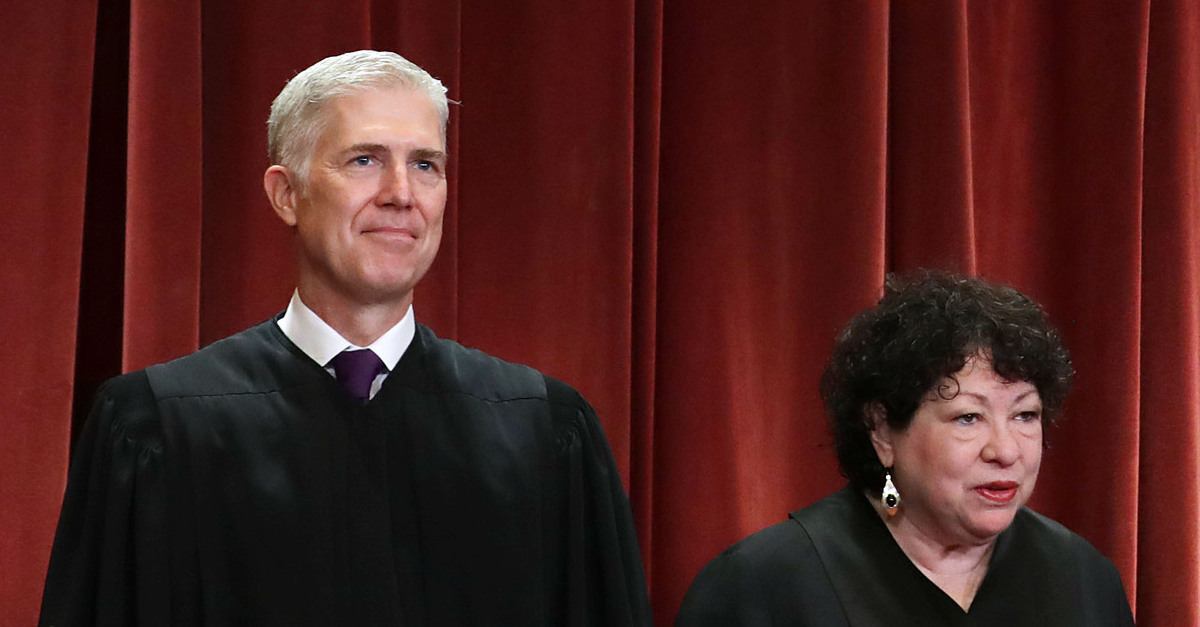
United States Supreme Court Justices Neil Gorsuch (L) and Sonia Sotomayor (R) pictured posing for an official court photo.
The Supreme Court of the United States heard oral arguments Wednesday in United States v. Zubaydah, a case begun by the Donald Trump administration and continued under President Joe Biden’s Department of Justice over whether the federal government must disclose information about secret overseas CIA prisons known as “black sites.”
Zayn al-Abidin Muhammad Husayn, better known as Abu Zubaydah, is the first CIA prisoner to undergo extensive torture. The Guantánamo Bay prisoner, a Palestinian, was alleged to have been an al-Qaeda operative involved in the planning of the 9/11 terror attacks, but his attorneys claim that the uncharged allegations against him derive from false, coerced confessions. The Senate Select Committee on Intelligence stated flatly: “The CIA later concluded that Abu Zubaydah was not a member of al-Qaida.” The so-called “torture report” chronicled his waterboarding, stress positions, sleep deprivation and other harsh treatment extensively.
Zubaydah was captured in 2002 in Pakistan, then moved around CIA “black sites” around the globe where he was subjected to “enhanced interrogation techniques” before being moved to Guantánamo Bay where he has been held in a military prison since 2006. Zubaydah spent ten months in a location said to have been in Poland, where he was allegedly subjected to repeated torture.
Zubaydah, through counsel, seeks a court order in conjunction with a Polish case to compel the U.S. government to turn over discovery materials about the involvement of two former CIA contractors—psychologists James Mitchell and Bruce Jessen—who worked on the CIA program. The federal government, however, argues that the information is protected by the “state secrets privilege,” which allows the government to keep secret information that would compromise national security interests.
The district court sided with Zubaydah, ruling that because much of the information sought is no longer secret, the privilege is inapplicable. The Trump Department of Justice (DOJ) appealed to the Ninth Circuit, which officially reversed but ruled that the government should still provide some of the information Zubaydah requested. The DOJ then appealed to the Supreme Court, arguing that Zubaydah’s entire subpoena should be quashed.
The justices appeared initially skeptical of arguments advanced by attorney David F. Klein on behalf of Zubaydah. Both Justices Clarence Thomas and Amy Coney Barrett pressed Klein on whether he really needed the documents he is requesting. If so much on the matter has already been disclosed as to render the information no longer secret, asked Justice Thomas, “why do you need additional testimony?” “So you don’t really need them,” echoed Justice Barrett.
It was Justice Stephen Breyer, however, who opened a more difficult line of questioning. Breyer first asked Klein to clarify his purpose in seeking documents. “All you want is to know what happened?” asked the elder justice.
“Exactly,” answered Klein.
“Okay, if it’s ‘exactly,'” asked Breyer, “why don’t you ask Mr. Zubaydah?” Klein explained that direct testimony would be impossible because Zubaydah is “being held incommunicado” at Guantánamo Bay.
Breyer took the opportunity to follow up on Zubaydah’s current confinement. “In Hamdi we said you could hold people in Guantanamo… ‘active combat operations against Taliban fighters’ apparently are going on in Afghanistan,” said Breyer. “Well they’re not anymore, so why is he there?”
Klein explained that there is a pending habeas corpus petition challenging Zubaydah’s confinement.
On rebuttal, Acting Solicitor General Brian H. Fletcher argued for the DOJ that Zubaydah was not “being held incommunicado,” but rather, that he is allowed to communicate on the same terms as anyone else, which are subject to security screening.
Justice Neil Gorsuch pressed Fletcher on whether the federal government could simply make Zubaydah available to give direct testimony on his time in Poland.
Fletcher responded that he was unable to specifically make that offer, as a request for Zubaydah to give direct testimony has not yet been made.
“I don’t understand why he’s still there after 14 years,” snapped Justice Breyer.
An exasperated Justice Gorsuch sharply commented to Fletcher, “I’d really appreciate a straight answer.”
“Will the government make petitioner available to testify as to his treatment on these dates?” Gorsuch asked.
Fletcher responded that because the request had not yet been made, counsel has not explored that request with the Department of Defense.
“This case has been litigated for years and all the way up to the United States Supreme Court,” remarked Gorsuch incredulously, “and you haven’t considered whether that’s an off-ramp that the government could provide that would obviate the need for any of this?”
“Will the government at least commit to informing this court whether it will or will not allow the petitioner to testify as to his treatment during these dates?” demanded Gorsuch.
“If the court would like a direct answer to that question, of course,” responded Fletcher.
“I personally would appreciate a direct answer to that,” replied the justice.
“Without the garland of invoking a state secrets privilege,” interjected Justice Sonia Sotomayor.
“You’re begging the question,” Sotomayor continued after Fletcher answered that the government has an interest in ensuring the secrecy of classified information. “We want a clear answer,” said the justice. “Are you going to permit him to testify as to what happened to him those dates without invoking a state secret or other privilege?” asked Sotomayor, “Yes or no?”
Before Fletcher could answer the court’s questions, Chief Justice John Roberts stepped in and asked about the scope of Fletcher’s authority to represent the United States as a client. “I’m not prepared to make representations on behalf of the United States,” Fletcher ultimately answered.
[image via Chip Somodevilla/Getty Images]